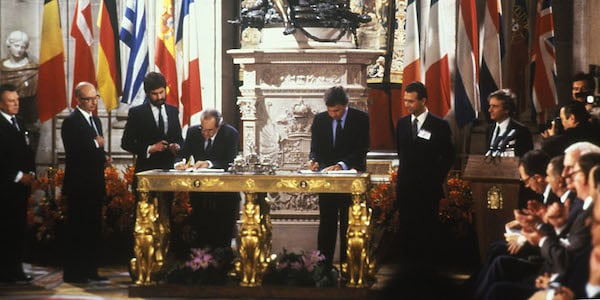
Spain and Portugal’s act of accession to the European Communities was signed on 12 June 1985 in Lisbon and Madrid. It was a poignant moment, though overshadowed by a terrorist attack by ETA. For many democrats it was the realisation of the dream of joining a project from which Spain had been excluded because of the Francoist dictatorship.
For Spain it has also been an instrument of change and modernisation and, even if not having added anything to democracy, it has enhanced the rule of law. The road to that dream, and the later path up to today’s EU, became the main lever to modernise Spain. Felipe González understood this very well, as he saw that Spain had to be active and provide ideas for action within the EU if it wished to mould it to its interests. It has participated ever since in all stages of the progress towards European integration. José María Aznar, belatedly convinced of the euro’s benefits for Spain, came to understand that too. The EU was the best mechanism to reform Spain, introduce VAT, liberalise sectors of the economy, count on reliable statistics and so on. Prime Ministers Rodríguez Zapatero and Rajoy also understood this.
Shared sovereignty, and the essential condition for Spain of being a Member State, is a way of preventing abuses and excesses: it is a guarantee. Although it was no impediment to past colossal mistakes like the construction and financial bubbles. Today such a situation would be less likely to occur since bank supervision, mistrusted at the national level, has now been transferred to the European Central Bank. Meanwhile, monetary union has become a union of fiscal discipline that has constrained Spanish public expenditure. This has provided some benefits, but also some negative effects. Spanish public policies today are framed by the parameters set in Europe, especially in the Eurozone, of which the country is a member. But there is scant talk of this in Spain’s sharp political debate.
This poses a problem for democracy, since an important part of national democracy is becoming void of content while not being replaced by more European democracy. This is not usually talked about in Spain perhaps because, as I heard a British diplomat comment long ago, Spaniards believe in Europe because they do not believe in their own institutions. Spaniards prefer the guarantee of acting sensibly being imposed from outside, something which, on the other hand, also suits governments that need to take unpopular decisions.
Thirty years later, and despite the erosion of the EU’s popularity in Spain, this is still the case. The EU remains the essential driving force behind reforms and transformations, although perhaps to a somewhat lesser degree. Thus, the 2020 Agenda (following the failure of the Lisbon Agenda) covers many issues but its success is not guaranteed because it lacks and mandatory mechanisms. Although all of Europe, including Spain, should be ashamed of its lack of generosity when it comes to welcoming not immigrants but refugees.
Another significant lever for change, but much more difficult to direct, is globalisation, especially in terms of the pressure from foreign competition and the opportunities it opens up. Spain has become globalised via Europe –thanks to the predictability and stability it provides– and Latin America. There was a vision behind this, towards Europe, which was showing the way. Spain knew what it hoped for and where to go: it wanted to be like the rest of the EU (today it is not so sure). Its other objective, Latin America in the 90s, was backed by the vision of the government and certain large-scale companies. Spain again became globalised via the Americas, as it had done in the 16th century, although very differently. Nevertheless, perhaps ‘Americanisation’ has slowed down the momentum of Spain’s interest in Asia, which is set to become the world’s largest economic area.
Perhaps Europe is becoming too small for Spain and other European countries, including such a central one as Germany. It remains the main destination and origin of Spain’s foreign trade, but to a lesser degree. Spanish exports to the rest of the EU have declined from 70% to 60% of the total, and they continue to decline despite the current growth since the crisis has led both companies and the government to intensify their search for other markets or destinations and sources of investment, in emerging countries and in Latin America (and the US, which is often forgotten). For Germany the proportion has dropped from 65% to 50%. Inevitably, this means that by becoming more global, Spain (and its partners) are becoming less European. However, they will continue to need Europe as a platform in order to have influence collectively in the globalisation process (as in the TTIP), but rivalries between EU Member States will still be there when they apply their foreign economic policies.
Doubts have also arisen as regards foreign policy. National policies now generally have less importance, but the weight of the common European position, despite counting on instruments such as the European External Action Service (EEAS), is still insufficient.
Thus, a question to consider is whether the new scenario is coming too late or too early for a Europe that is very different from the one that Spain entered 30 years ago, But, of course, Spain is also very different today, as it has undergone a thorough transformation and is still being transformed, largely due to its EU membership.


